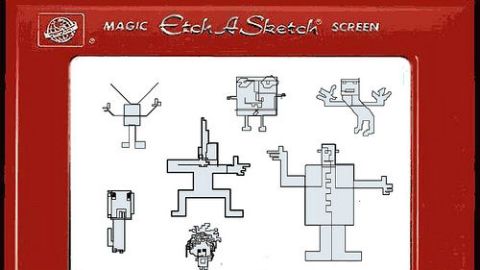In Praise of Etch-a-Sketch Politics and Politicians

The Etch-a-Sketch to which Mitt Romney has been disparagingly likened is a wonderful toy. The Ohio Art Company invented it in 1960, and it was one of the original inductees into the National Toy Hall of Fame in 1998.
The Etch-a-Sketch is a mechanical drawing toy, a portable drafting table. With two knobs, you can manipulate an aluminum powder filling so that different designs appear on the screen and then, magically, you can make all of your drafts disappear with a turn of the knobs.
It’s not a bad metaphor to be, if you’re a political candidate, although Romney has been unanimously ridiculed for having been compared to one.
Romney’s problem isn’t that he’s an Etch-a-Sketch. It’s that he’s a panderer. He chose to pretend to be an ideologue, unconvincingly, to try to secure the allegiance of a base that easily detects his pandering and won’t support him enthusiastically, in any case.
Romney had an alternative. What if he had decided to run proudly as a non-ideological candidate? It’s not a crazy idea. What if he had embraced his Etch-a-Sketch soul and presented himself as a problem-solver technocrat who was willing and able to listen to people, be receptive to the particular will of those people, appraise data with an open mind, and to solve problems without bias or malice based on prefigured ideology—and without the viewpoint intolerance that comes with it?
I can’t help but think that revulsion to the Etch-a-Sketch as a metaphor of politics paces the demise of the Engineer as an American cultural icon, and it’s a troubling development.
The engineering mindset, celebrated and groomed in the age of LEGOs, tinker toys, Lincoln Logs, the Etch-a-Sketch and the romance of the space shot, looks at how things work, not what they mean metaphysically. It’s a “scientifical” perspective, as I used to call it as a child.
The Engineer dissects problems with a mechanically-discerning eye into discrete, actionable steps. He prizes ingenuity and innovation. The engineer asks, “how do I fix this,” not, “how do I force this into my Procrustean ideological mold?” It’s a mindset that invents, tinkers, tweaks, solves and is temperamentally agnostic. Bridges don’t have souls. Engineers are inherently optimistic in their grounded empiricism.
I’m not a Republican, but at this point I’d welcome a serious presidential candidate who came into office with an Etch-a-Sketch mind, and who tried things, who was willing and permitted to draft things in the most literal sense.
They’d do this based on a core set of values that included: efficacy, problem-solving, receptivity to ideas, persistence, and pragmatism. They wouldn’t approach problems with the values of inflexibility, rigidity, anti-intellectual incuriosity, and an ideology—on either side—that acts like a brutal Cuisinart, reducing and grinding all evidence into the same indistinguishable mush, to be handled according to the same ideology. Why, after all, do we think this is a good thing, to have an idee fixe in our heads in an era that demands nothing if not imagination, and creativity?
Does this mean that my Etch-a-Sketch President would be an unpredictable, rudderless political creature, because he lacked “Core Beliefs”? No. It’s not as if the only guiding compass in this world is produced by ideological calcification—and, to be fair, the only set of principles that absolutely can, and must, guide the President is the Constitution.
When all you have is a hammer, every problem is a nail. Some big problems that didn’t have to be “ideological” in the first place have become so, because as a culture we don’t seem to value alternative problem-solving approaches.
For example, as a simple matter of demographics we need to solve social programs—Social Security, and Medicare. Some politicians might wish to disband both programs, but the majority does not, since they’re deservedly popular. This is primarily a heavy-lift problem for the engineer.
What about social issues. I have to agree with Indiana governor Mitch Daniels, who wished that we could call a truce on the culture war for a year— a war that reeks of futility.
The engineer might ask: How do we solve the problem that two groups in the U.S. have elementally opposed and most likely irreconcilable views in their consciences and souls of the status of a pre-viability blastula or embryo (some think it has a soul and full personhood, as a matter of faith, and others not at all, as a matter of science), and how do we live in the same country given these beliefs?
But the larger point, and problem, here is that we no longer live in the age of the “essay,” as in the French word essai, as in, “totry.” This isn’t the age of the “draft,” either, or of the Etch-a-Sketch.
In an earlier column on Huffington Post I noted the paradox of bullshit today—that we hear “bullshit” in the useful sense of provisional, tentative, germinal ideas, all the time in social media, but these freewheeling, exploratory ideas are rendered indelibly permanent in the ether, which functions, in reality, not so much like ether as a kind of concrete that sinks the reputations of our public figures. Indelible bullshit is the worst of both worlds.
Had he chosen early on not to pander, Romney could have run as a competent, clean-slate pragmatist.
It’s too late now. Romney’s tainted his record with panders that can’t be undone. While a non-ideologue candidate might have appealed to some, and perhaps many, a panderer appeals to no one at all.
Romney can’t hide the lip-synching that he’s already done to his party’s social conservative base. It’s not easy to be an Etch-a-Sketch candidate in a Karaoke world.





